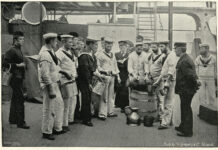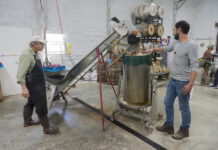When it comes to understanding the authority differences between the Food and Drug Administration (FDA) and the Tax and Trade Bureau (TTB), there is a great deal of confusion among craft distillers. What role does the FDA have on the regulation and oversight of distilled spirits and its operations? What are the basics with which distillers need to be familiar? What are the potential consequences distillers could face by violating FDA regulations? I sat down with several industry members to find out what distillers need to know.
You’re Accountable to the FDA, Too
It is a common belief that the FDA has no jurisdiction over distilled spirits and their operations, but that is not true. The two federal agencies work in parallel and each has its own responsibilities and objectives. In general, the TTB’s goals are to collect federal excise taxes, ensure licensed distilleries operate within the certified federal regulations, ensure a competitive environment protecting the three-tier system of alcohol distribution and protect consumers from misleading, incorrect or confusing labels. The FDA’s goals include ensuring food and beverage manufacturing facilities operate in a clean, transparent and consistent manner with well-documented processes to produce products that are safe for consumers. Distilleries are ultimately accountable to both organizations. In addition to having the required TTB DSP license, all distillers must register with the FDA. They also are all subject to surprise FDA inspections.
Fortunately for distillers, the grey and confusing area for the overlapping jurisdiction and approvals between the TTB and the FDA falls mainly with low-proof beverages. In general, the FDA regulates the labeling of some beers and wines that are under 7% ABV, and the TTB regulates labels for alcohol beverages over 7%. This will not affect most distilleries. When the TTB’s and the FDA’s jurisdictions and regulations do overlap or conflict, they have a memorandum of understanding to help clarify the hand-off between organizations, which you can find at https://www.ttb.gov/main_pages/memo-understanding.shtml.
Handling the FDA
I sat down with David Raad, President and Founder of Six & Twenty Distillery in South Carolina, to ask him what distillers need to know about the FDA. He was quick to point out that the two agencies are very different and speak two different languages. However, like the TTB, when the FDA does an inspection, the regulations are often up to the inspector’s interpretation and scrutiny.
“We are a registered food plant with the FDA, like all distillers should be, but the application is in a completely different language than the TTB application. When the FDA does intervene with a distillery, the rules and regulations are up to interpretation. One FDA inspector may say the bottling operations must be in a separate room where others are indifferent. The overlap of regulations over distillery operations between the TTB and the FDA often conflicts. Many distilleries would not be able to operate as-is under strict FDA regulations.”
How does Raad balance TTB and FDA compliance? He hopes that all craft distillers take product safety very seriously.
“We have written procedures for everything: how it’s handled, produced and delivered. We track the lots of materials, batches and finished goods as far back as we can go,” Raad said. “We do our absolute best to provide a safe product to the consumer. We know that if we get an FDA inspection, we hope to be ready. If distillers aren’t doing everything they can to provide a safe product, they need to re-evaluate their processes. We all have to do the right things to avoid increased supervision.”
Raad offered some important advice on preparing distillery employees at all levels for a surprise FDA inspection. “All distillery employees should be educated on both FDA and TTB regulations in case of an audit. Everyone should have the mind-set that the FDA or the TTB could show up at any time. I inspect the distillery daily to ensure procedures and cleaning procedures are being followed.”
About the TTB’s and the FDA’s ultimate goals and objectives, Raad said, “We don’t consider the TTB and the FDA to be cruel supervisory agencies. They each have a responsibility to protect the consumers. It’s our job as distillers to follow the regulations and help them do their job. We must follow their rules. Their rules can help us make our product better. We do what we can to make our processes more consistent and my product safer. In the end, the TTB’s and the FDA’s collective regulations are meant to be a guide to make that happen.”
You Must Register With the FDA
Jennifer Norris had a few visits from the FDA as an import manager for a distributor in Portland, OR. Norris’s advice to craft distilleries is, “Not only must every distiller register with the FDA as a food facility, they also have to update their registration every even year in the fourth quarter. The FDA visited our distributor warehouse unannounced to do an inspection. The distributor had some broken sheetrock from a forklift accident that had to be repaired immediately. Everything must be off the floor and on pallets or racks. Lucky for us, we were able to fix the issues quickly.”
Paul Tomaszewski, co-owner and co-founder of the MB Roland Distillery in Pembroke, KY, has a perspective on the TTB versus the FDA. Tomaszewski said the TTB has the advantage of understanding the distillation process.
“As distillers, it’s far better to be able to work with the TTB exclusively. One bureaucracy is always better than two. The TTB’s simple mission and experience managing the alcohol sector helps to make a craft distiller’s life a bit easier. Distillers who have had to work with the FDA can often find it frustrating explaining the entire process.”
Paul Dunning, owner of Private Label Distillery in Denver, CO, is a co-packer who helps craft distillers and brand owners. He reinforced the need for all distilleries to make consumer safety paramount to avoid broader scrutiny by the FDA.
“A lot of distillers don’t know you have to be registered with the FDA. To date, I’ve never had to interact with the FDA, but we take compliance very seriously. It’s important that all craft distilleries take consumer protection very seriously to avoid putting contaminated product, such as excessive methanol or harmful ingredients, out to the public. If there is a significant issue, the FDA might get more involved with distillery operations.”
An FDA Inspection
Paul Werni, owner of 45 Parallel Spirits in Richmond, WI, had an FDA inspection and shared the results and his perspective: “The FDA and the TTB are very different. We went to the ADI conference in the spring and found out that the FDA are looking into small distilleries. They come in unannounced and usually come with a local inspector from the state. It’s important to know that the person who is inspecting your distillery could be the same person inspecting a local dairy farm.”
I asked Werni what happened during the inspection and what advice he had for distillers who may get the surprise inspection.
“They asked us to walk them through the process and facility and to describe the process to them. Keep it very simple. When you describe the process do not offer up more details than asked. ‘This is where we do our mashing. Then it goes into this still. Here is where we blend it and bottle it.’ We over-shared about hot water recycling from the condenser, and it cost us $1,500 worth of equipment to test water that will be distilled multiple times. They consider cooling-jacket return water as ‘reclaimed water’ that needs to be tested for bacteria and plate counts with a microscope.”
When asked about the differences between a TTB audit and the FDA audit, Werni shared his experiences from both.
“The TTB and the FDA are there for very different reasons. The TTB is about tracking what you make and paying the correct taxes. They are concerned with your procedures to measure alcohol, as it’s tied to taxes. They’ll pull samples to test. If you have the correct equipment and systems in place, you will be OK. They are also concerned with your labels matching up with COLA approvals. Make sure you have printouts of all your approved COLAs. It’s a much better TTB than it used to be. They are embracing online systems, innovation and trying to improve. The FDA’s goals are food safety. They want the product to be safe for consumers. That said, it all varies from agent to agent. Both the TTB and FDA auditors can vary greatly between states and locations.”
Werni gave his advice on preparing distillery employees for an FDA audit.
“The biggest thing that a distiller needs to know is that the FDA will arrive unannounced, and if the owners or distillers are not there, whoever is there will have to lead the audit. Have regular meetings with your staff on what they can anticipate in an audit. Where is your recall procedure? Where is your hazardous material procedure? Where are your hoses? How are they cleaned? Someone must be there to walk them through. Prepare your people ahead of time.”
The takeaways for all distilleries are to understand that both the FDA and TTB have jurisdiction over distillery operations, but with very different objectives. The TTB is here to collect the correct excise taxes while the FDA is here to ensure consumer safety. Although most distillers’ interaction with the FDA may be small to none, it is important to be prepared for an unannounced inspection. All distilleries should be registered with the FDA and be ready when they come knocking.








